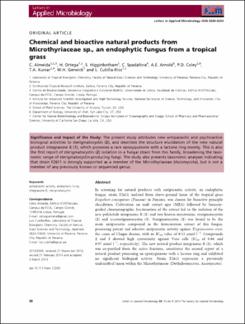Chemical and bioactive natural products from Microthyriaceae sp., an endophytic fungus from a tropical grass
Fecha
2014-03-04Autor
Almeida, C.
Ortega, H.
Higginbotham, S.
Spadafora, C.
Arnold, A.E.
Coley, P.D.
Kursar, T.A.
Gerwick, W.H.
Cubilla-Rios, L.
Metadatos
Mostrar el registro completo del ítemResumen
In screening for natural products with antiparasitic activity, an endophytic fungus, strain F2611, isolated from above-ground tissue of the tropical grass Paspalum conjugatum (Poaceae) in Panama, was chosen for bioactive principle elucidation. Cultivation on malt extract agar (MEA) followed by bioassayguided chromatographic fractionation of the extract led to the isolation of the new polyketide integrasone B (1) and two known mycotoxins, sterigmatocystin (2) and secosterigmatocystin (3). Sterigmatocystin (2) was found to be the main antiparasitic compound in the fermentation extract of this fungus, possessing potent and selective antiparasitic activity against Trypanosoma cruzi, the cause of Chagas disease, with an IC50 value of 0 13 lmol l 1. Compounds 2 and 3 showed high cytotoxicity against Vero cells (IC50 of 0 06 and 0 97 lmol l 1, respectively). The new natural product integrasone B (1), which was co-purified from the active fractions, constitutes the second report of a natural product possessing an epoxyquinone with a lactone ring and exhibited no significant biological activity. Strain F2611 represents a previously undescribed taxon within the Microthyriaceae (Dothideomycetes, Ascomycota

